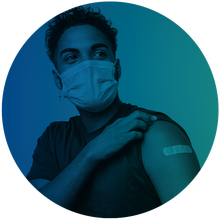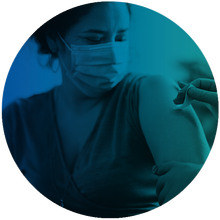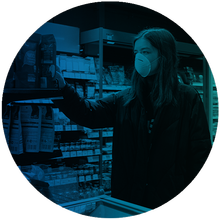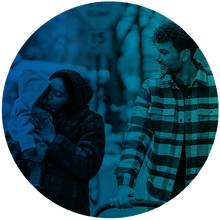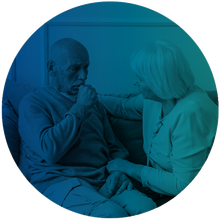
Talking about COVID-19 vaccines while building trust
Dispelling myths and alleviating apprehensions around vaccination requires a trusted relationship and a safe, non-judgmental environment for individuals to voice their concerns and ask questions. These guides equip readers with the skills to answer questions about COVID-19 vaccines and participate in conversations with others, ultimately supporting vaccine confidence in their communities.
Choose a topic for frequently asked questions and helpful responses as well as additional resources to give to your contacts who wish to seek out additional information.
General Questions
This webpage is designed to help client-facing staff competently respond to common vaccine questions. It lists frequently asked questions and helpful responses as well as provides additional resources to give to clients who wish to seek out additional information.
Boosters
COVID-19 vaccines protect against severe illness, hospitalization, and death. It is important to stay up-to-date with your COVID-19 vaccines by getting a booster when you are eligible.
Breakthrough Infections
It is uncommon for people to get COVID-19 after they are vaccinated, but it can happen. Scientists call this a “breakthrough infection.” COVID-19 vaccines are effective at preventing infection, serious illness, and death. However, since vaccines are not 100% effective at preventing infection, some people who are fully vaccinated will still get COVID-19.
Children and Youth
To help stop the spread of COVID-19, it is important to vaccinate people as soon as they are eligible. Right now, that means everyone age 12 and up. Widespread vaccination is the key to being able to go back to pre-pandemic activities, such as in-person classes, after-school activities, social gatherings, and travel.
Employer Requirements
With increasing numbers of organizations and businesses requiring vaccinations, it is understandable that employees have questions. For workers in refugee, immigrant and migrant communities, language and other barriers can make it more difficult to have these questions answered by their work supervisor or human resources representative. Instead, they may bring these questions to client-facing staff in refugee service agencies and community-based organizations.
End of Public Health Emergency (PHE)
On May 11, 2023, the public health emergency (PHE) will expire and many will see changes in COVID-19 healthcare costs, insurance coverage and renewals, and food benefits. These changes are likely to disproportionately impact some refugee, immigrant, and migrant (RIM) communities. Confidently answer questions from the community with this conversation guide outlining some of the changes.
Fertility + Parenthood
COVID-19 vaccines do not affect people’s ability to have children. There is no evidence the vaccines affect women’s ability to get pregnant, nor do they affect men’s reproductive ability. COVID-19 vaccines are also safe for caregivers who are pregnant or breastfeeding.
Immigration and COVID-19
Given the importance of the COVID-19 vaccine to keep us all safe, keep people at work, and keep kids in school, USCIS added the COVID-19 vaccine as one of the vaccines required for your adjustment of status (lawful permanent resident, or Green Card) application. Our conversation guide has answers to common questions about this new requirement.
Infection + Recovery
Many people are getting sick from COVID-19 every day, and some people experience severe illness or die. Testing, quarantining, and isolation are all important steps to take to keep yourself and others safe from COVID-19 if you feel sick. There are treatments available to help you recover from COVID-19, but it is important to start them right away, especially if you are at risk for becoming dangerously ill.
COVID-19 Testing
Even if you are vaccinated, you can get infected with COVID-19 and may not know it because you may not feel sick at all. By getting tested and staying away from others until you know the results, you can help stop the spread of COVID-19 and protect your community.
Variants of Concern
Viruses are always changing to try to outsmart our bodies and to assure it can survive through spreading to new people. When a big change happens, scientists call it a new variant. Certain variants present a greater danger than others, like Delta and Omicron. These are called variants of concern.
Wearing a Mask
Whether you have been vaccinated or not, it's safest to wear a mask. While getting vaccinated is the most important step for you to take to protect yourself and your community, wearing a mask provides even more protection. Masks protect you and people around you from getting COVID-19.

